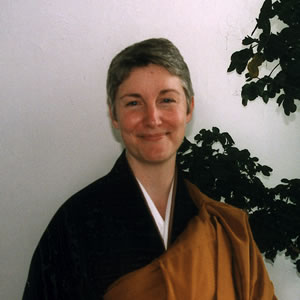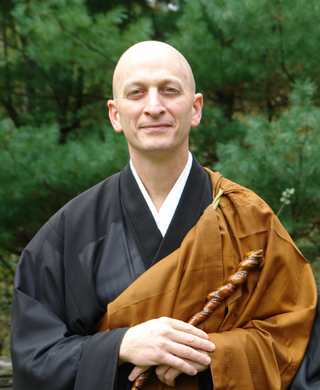Related Research Articles

Tricycle: The Buddhist Review is an independent, nonsectarian Buddhist quarterly that publishes Buddhist teachings, practices, and critique. Based in New York City, the magazine has been recognized for its willingness to challenge established ideas within Buddhist communities and beyond.

Stephen Batchelor is a Scottish Buddhist author and teacher, known for his writings on Buddhist subjects and his leadership of meditation retreats worldwide. He is a noted proponent of agnostic or secular Buddhism.

Seungsahn Haengwon, born Duk-In Lee, was a Korean Seon master of the Jogye Order and founder of the international Kwan Um School of Zen. He was the seventy-eighth Patriarch in his lineage. As one of the early Korean Zen masters to settle in the United States, he opened many temples and practice groups across the globe. He was known for his charismatic style and direct presentation of Zen, which was well tailored for the Western audience.

The Kwan Um School of Zen (관음선종회,觀音禪宗會) (KUSZ) is an international school of zen centers and groups founded in 1983 by Zen Master Seung Sahn. The school's international head temple is located at the Providence Zen Center in Cumberland, Rhode Island, which was founded in 1972 shortly after Seung Sahn first came to the United States. The Kwan Um style of Buddhist practice combines ritual common both to Korean Buddhism as well as Rinzai school of Zen, and their morning and evening services include elements of Huayan and Pure Land Buddhism. While the Kwan Um Zen School comes under the banner of the Jogye Order of Korean Seon, the school has been adapted by Seung Sahn to the needs of Westerners. According to James Ishmael Ford, the Kwan Um School of Zen is the largest Zen school in the Western world.

The Jogye Order, officially the Jogye Order of Korean Buddhism, is the representative order of traditional Korean Buddhism with roots that date back 1200 years to the Late Silla National Master Doui, who brought Seon and the practice taught by the Sixth Patriarch, Huineng, from China around 820 CE. The name of the Order, Jogye, was adopted from the name of the village where Patriarch Huineng's home temple, Nanhua Temple, is located.
The Buddhist Peace Fellowship (BPF) is a nonsectarian international network of engaged Buddhists participating in various forms of non-violent social activism and environmentalism. The non-profit BPF is an affiliate of the international Fellowship of Reconciliation working toward global disarmament and peace, helping individuals suffering under governmental tyranny in places such as Burma, Bangladesh, Tibet and Vietnam. Headquartered in Oakland, California, BPF was incorporated in 1978 in Hawaii by Robert Baker Aitken, his wife Anne Hopkins Aitken, Nelson Foster, Ryo Imamura and others. Shortly after other notable individuals joined, including Gary Snyder, Alfred Bloom, Joanna Macy, and Jack Kornfield. Generally speaking, the BPF has a tendency to approach social issues from a left-wing perspective and, while the fellowship is nonsectarian, the majority of its members are practitioners of Zen Buddhism.
BPF's work includes:
- Sparking conversation at the intersection of Buddhism and social justice;
- Training Buddhist political activists;
- Mobilizing people to action from a Buddhist perspective;
- Building a network of radical Buddhist activists.

Yamada Koun Zenshin, or Koun Yamada, was a Japanese Buddhist who was the leader of the Sanbo Kyodan lineage of Zen Buddhism, the Dharma heir of his teacher Yasutani Haku'un Ryoko. Yamada was appointed the leader of the Sanbo Kyodan in 1967, 1970 or 1973 and continued to differentiate the lineage from other Japanese Zen traditions by deemphasizing the separation between laypeople and the ordained—just as his teacher Yasutani had done. Yamada was also instrumental in bringing Christians to the practice of Zen that “by the end of Yamada’s teaching career approximately one quarter of the participants at his sesshins were Christians”.

Joan Jiko Halifax is an American Zen Buddhist teacher, anthropologist, ecologist, civil rights activist, hospice caregiver, and the author of several books on Buddhism and spirituality. She currently serves as abbot and guiding teacher of Upaya Zen Center in Santa Fe, New Mexico, a Zen Peacemaker community which she founded in 1990. Halifax has received Dharma transmission from Bernard Glassman, and previously studied with the Korean zen master Seung Sahn.
The Taego Order or Taego-jong is the second largest order in Korean Seon, the Korean branch of Chan Buddhism.
Zen master is a somewhat vague English term that arose in the first half of the 20th century, sometimes used to refer to an individual who teaches Zen Buddhist meditation and practices, usually implying longtime study and subsequent authorization to teach and transmit the tradition themselves.

The Venerable Samu Sunim, born Sam-Woo Kim, was a Korean Seon sunim previously of the Jogye Order. He claimed to have received Dharma transmission from Zen Master Weolha Sunim in 1983. He taught primarily in Canada and the United States, having opened centers in Toronto, New York City, Ann Arbor, Michigan and Chicago, Illinois as well as Mexico City.

Bonnie Myotai Treace is a Zen teacher and priest, the founder of Hermitage Heart, and formerly the abbot of the Zen Center of New York City (ZCNYC). She teaches currently in Black Mountain and Asheville, North Carolina. Myotai Sensei is the first Dharma successor of John Daido Loori, Roshi, in the Mountains and Rivers Order (MRO), having received shiho, dharma transmission, from him in 1996. Serving and training for over two decades in the MRO, she was the establishing teacher and first abbess of the ZCNYC. At the Monastery she was the Vice Abbot, the first director of Dharma Communications, editor of Mountain Record, and coordinator of the affiliates of the MRO. Treace, ordained as a Zen monastic, now lives as a lay teacher, working primarily with her long-term students.

A Dharma talk (Sanskrit) or Dhamma talk (Pali) or Dharma sermon is a public discourse on Buddhism by a Buddhist teacher.

Hyobong Hangnul (1888—1966) was a Korean Jogye Seon master who was the former head of the Jogye Order. The master of the late Kusan Sunim, Hyobong was the guiding teacher of several temples in Korea—including Songgwang-sa and Haein-sa. Stephen Batchelor has called him, "One of the most remarkable Buddhist teachers of this century in Korea." Hyobong was also the first Korean individual to serve as a judge for the Japanese Imperial government, though he resigned his position after being troubled with having sentenced a man to death. Having told no one of his resignation, he took to selling toffee in rural towns and eventually came to ordain as a sunim under Sŏktu Sunim. Hyobong went on to live as a traveling monk, visiting monastery after monastery for many years. He died in the posture of zazen while at P'Yoch'chung monastery in 1966.

Geoffrey Shugen Arnold is Rōshi of the Mountains and Rivers Order (MRO) founded by John Daido Loori, from whom Shugen received shiho, or dharma transmission, in July 1997. As a lineage holder in the Sōtō tradition, Shugen currently serves as head of MRO and abbot of Zen Mountain Monastery in Mt. Tremper, New York, where he serves as the full-time resident teacher. Trained as a musician, Shugen was introduced to and began practicing Zen meditation in 1975. He began his formal training at Zen Mountain Monastery in 1984, and received tokudo, full monastic ordination, in 1988. Shugen's teachings have appeared in various Buddhist publications, including Buddhadharma: The Practitioner's Quarterly, The Mountain Record and in The Best Buddhist Writing 2005 and 2009. He is the author of O, Beautiful End, a collection of Zen memorial poems, published by Dharma Communications in 2012.

Songgwangsa, one of the three jewels of Seon Buddhism, is located in South Jeolla Province on Mount Jogye on the Korean Peninsula. Situated approximately 18 miles (29 km) away from the sea, it is within the Jogyesan Provincial Park.
Secular Buddhism—sometimes also referred to as agnostic Buddhism, Buddhist agnosticism, ignostic Buddhism, atheistic Buddhism, pragmatic Buddhism, Buddhist atheism, or Buddhist secularism—is a broad term for a form of Buddhism based on humanist, skeptical, and agnostic values, valuing pragmatism and (often) naturalism, eschewing beliefs in the supernatural or paranormal. It can be described as the embrace of Buddhist rituals and philosophy for their secular benefits by people who are atheist or agnostic.

Seon or Sŏn Buddhism is the Korean name for Chan Buddhism, a branch of Mahāyāna Buddhism commonly known in English as Zen Buddhism. Seon is the Sino-Korean pronunciation of Chan an abbreviation of 禪那 (chánnà), which is a Chinese transliteration of the Sanskrit word of dhyāna ("meditation"). Seon Buddhism, represented chiefly by the Jogye and Taego orders, is the most common type of Buddhism found in Korea.

Daehaeng Kun Sunim was a Korean Buddhist nun and Seon (禪) master. She taught monks as well as nuns, and helped to increase the participation of young people in Korean Buddhism. She made laypeople a particular focus of her efforts, and broke out of traditional models of spiritual practice, teaching so that anyone could practice, regardless of monastic status or gender. She was also a major force for the advancement of Bhikkunis (nuns), heavily supporting traditional nuns’ colleges as well as the modern Bhikkuni Council of Korea. The temple she founded, Hanmaum Seon Center, grew to have 15 branches in Korea, with another 10 branches in other countries.
Frank Jude Boccio is a teacher and one of the originators of mindful yoga. He is known both for his teaching in centres across America, and for his 2004 book Mindfulness Yoga: The Awakened Union of Breath, Body and Mind, which describes a practice that combines yoga as exercise and Buddhist meditational practice.
References
- Findly, Ellison Banks (2000). Women's Buddhism, Buddhism's Women: Tradition, Revision, Renewal . Wisdom Publications. ISBN 0-86171-165-3.
- Prebish, Charles S.; Martin Baumann (2002). Westward Dharma: Buddhism Beyond Asia. University of California Press. ISBN 0-520-22625-9. OCLC 48871649.